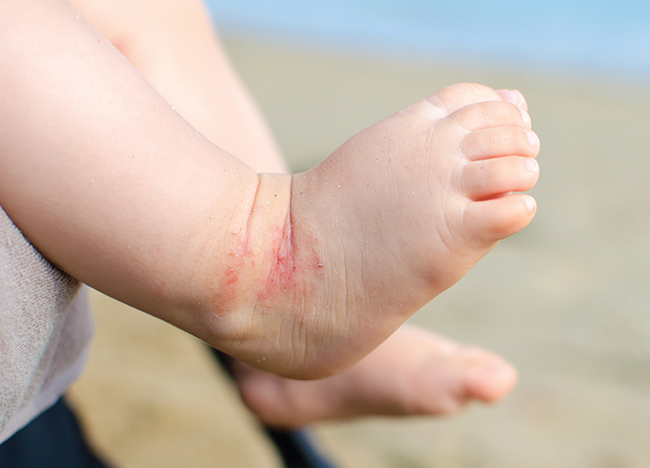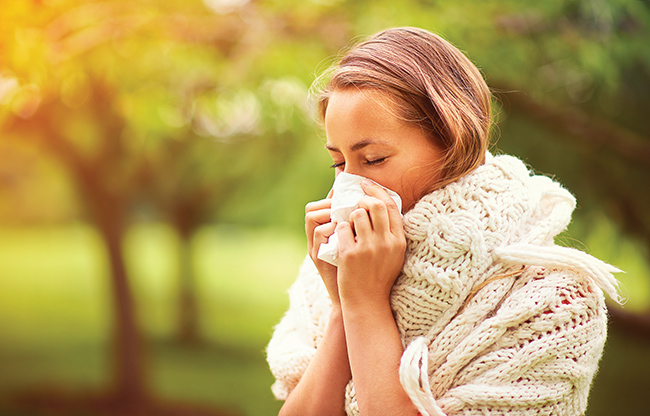Allergy UK is committed to raising the awareness of allergies and the impact it can have on a person’s life…

Although it sometimes can be trivialised, allergy can be a severe medical condition for many people. The fact is that both children and adults with an allergy can experience painful and unpleasant symptoms which will have a real impact on their quality of life. Allergy UK, the leading national patient charity which supports the 21 million people living with allergy in the UK, provides help and support for people living with allergy, and their families.
Eczema in children
Atopic eczema in children can be very difficult to manage. Parents have to constantly monitor their child’s eczema to make sure that the skin does not become dry and cracked, which can lead to allergens and bacteria entering the body. Up to 80% of all children under one year old with moderate to severe eczema are sensitised to one or more food allergens.
Those with mild eczema often outgrow it and are unlikely to have a food allergy. However, to help target the skin barrier to reduce eczema means daily applications of emollients, with many families experiencing broken nights caring for their children when they wake up because of pain and discomfort. Some families go as far as to leave their jobs because a childminder may not be able to provide the constant treatment and care that a child with severe eczema needs. This alone can put a financial burden on the family, which is not helped by the extra costs of buying creams and sometimes, in desperation, even paying for allergy advice and non-validated testing.
With around 1.7million school children suffering from eczema in the UK, improved awareness of the condition is essential as parents all over the UK are struggling to identify and manage their child’s condition. Schools often do not have the resources to help a child with eczema and this can impact on their learning and social life.
Eczema can also be a symptom of food allergy in babies and young children, so needs to be seen by a paediatric allergist/immunologist or dermatologist experienced in treating and managing allergy.

Food allergy
Parents of children with a food allergy live in constant worry, often taking multiple precautions before letting their child leave home because of their fear they may experience a reaction. Shockingly, there are around 10 deaths a year from anaphylactic reactions, the most severe form of allergic reaction, which shows the growing need for awareness and education. Everyone from parents to those running restaurants and cafes need to understand the reactions that an allergy to food can trigger and how to deal with them.
Respiratory conditions
Respiratory allergies can also cause unpleasant symptoms. Seasonal allergic rhinitis or hay fever is the most common allergy from March-September, with an estimated 15 million people in the UK experiencing debilitating symptoms such as sneezing, runny nose, itching and ‘post-nasal drip’ (mucus at the back of the throat). It can also cause red, itching and watery eyes. Other symptoms include blocked nose, which can lead to headaches and difficulty sleeping.
Symptoms can be triggered by tree and grass pollen, which can affect children at school during the spring and summer. Broken nights can also have an impact on concentration and productivity, which can be problematic during exam time.
A study by Dr. Samantha Walker showed that students with hay fever can drop as much as one grade because of their condition. That is why Allergy UK has called for the peak exam time to be moved outside of the hay fever season because of the difficulties that hay fever can cause in young people.

Allergens in the home
Adults and children who suffer from persistent allergic rhinitis tend to experience symptoms all year round, and the condition can be easily mistaken for an ‘all-year cold.’ However, it is often caused by indoor allergens such as house dust mite, pets and indoor moulds. It tends to be worse in winter time when we have our central heating on and windows closed, creating an ideal environment for the house dust mite.
Allergy UK estimates around 12 million people in the UK suffer because of indoor allergies dubbed as ‘home fever’. A recent survey found that 58% of allergy sufferers react to house dust mite allergen. But it’s not just house dust mites that cause problems; 31% of sufferers are allergic to mould and 45% of sufferers said that their allergy is triggered by pets. On top of that, the chemicals in cleaning products cause a reaction in over 30% of sufferers.
With the most common symptoms of an indoor allergy or ‘home fever’ being a runny nose and sneezing, it is understandable that people all too often confuse allergy symptoms with a common cold or flu and therefore don’t treat the cause of the problem. Our survey revealed people just aren’t doing enough to reduce the house dust mite allergen. 59% of indoor allergy sufferers said their symptoms are worse in the bedroom; not surprising when you consider the average bed harbours two million house dust mites and the average pillow doubles in weight in six months due to dust mite faeces.
How allergy UK can help
Allergy UK offers over 100 free fact sheets containing information on how to manage most types of allergy. They are all on the Allergy UK website, www.allergyuk.org. The dedicated Helpline is free and available on 01322 619898 for advice and support.
Reaching out
The Allergy UK Helpline is available on 01322 619898 and the website can be found at www.allergyuk.org.

